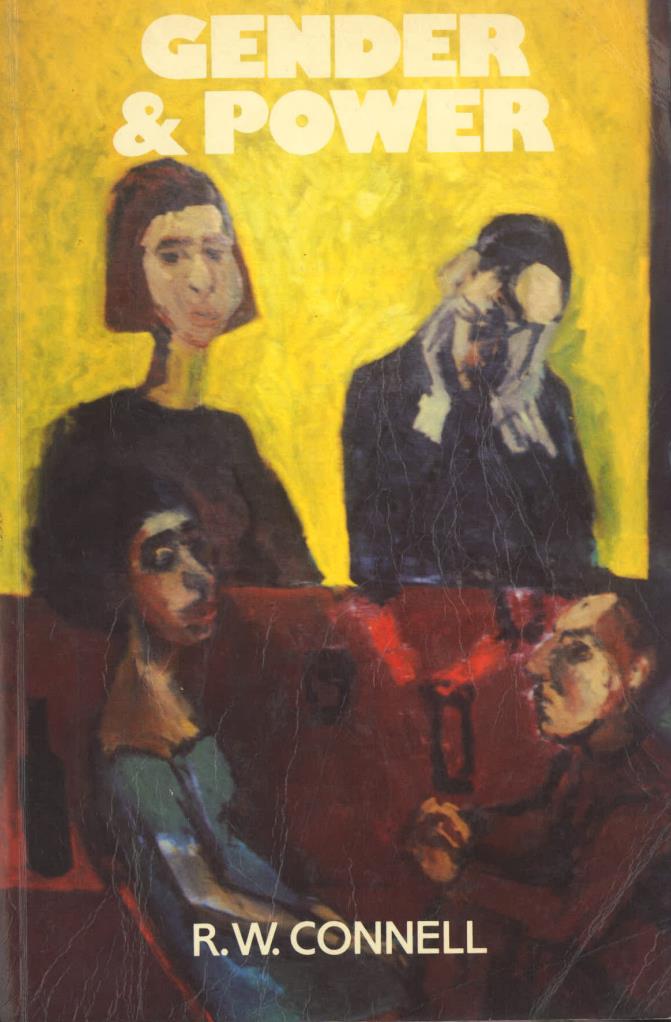
HENDER &P⊙NE R.W.CONNELL
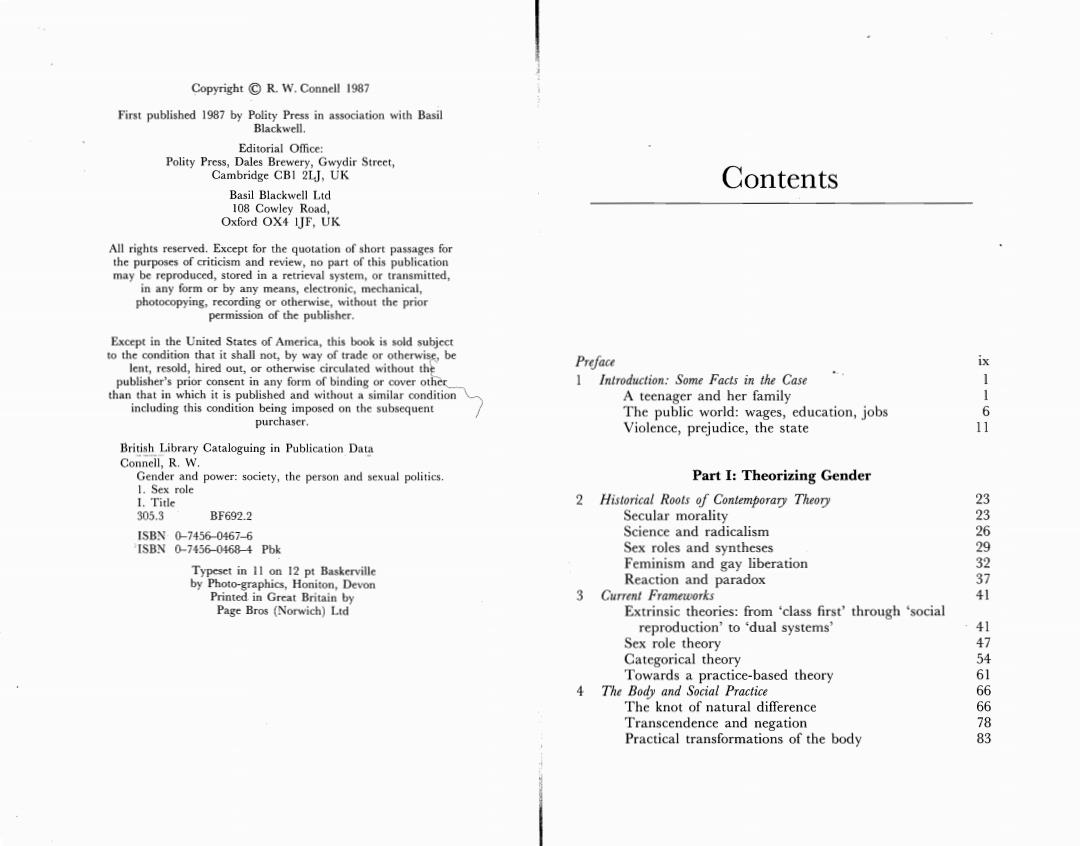
Copyright C R.W.Connell 1987 First published 1987 by Polity Press in association with Basil Blackwell. Editorial Office: Polity Press,Dales Brewery,Gwydir Street, Cambridge CBI 2LJ,UK Contents Basil Blackwell Ltd 108 Cowley Road, Oxford OX4 IJF,UK All rights reserved.Except for the quotation of short passages for the purposes of criticism and review,no part of this publication may be reproduced,stored in a retrieval system,or transmitted, in any form or by any means,electronic,mechanical, photocopying,recording or otherwise,without the prior permission of the publisher. Except in the United States of America,this book is sold subject to the condition that it shall not,by way of trade or otherwise,be ix lent,resold,hired out,or otherwise circulated without the Preface publisher's prior consent in any form of binding or cover other 1 Introduction:Some Facts in the Case than that in which it is published and without a similar condition A teenager and her family 1 including this condition being imposed on the subsequent The public world:wages,education,jobs 6 purchaser. Violence,prejudice,the state 11 British Library Cataloguing in Publication Data Connell,R.W Gender and power:socicty,the person and sexual politics. Part I:Theorizing Gender 1.Sex role 1.Title 2 Historical Roots of Contemporary Theory 23 305.3 BF692.2 Secular morality 3 ISBN0-7456-0467-6 Science and radicalism 26 ISBN0-7456-0468-4Pbk Sex roles and syntheses 2 Typeset in 11 on 12 pt Baskerville Feminism and gay liberation 3 by Photo-graphics,Honiton,Devon Reaction and paradox 37 Printed in Great Britain by 3 Current Frameworks 41 Page Bros (Norwich)Ltd Extrinsic theories:from'class first'through 'social reproduction'to 'dual systems' 41 Sex role theory 47 Categorical theory 54 Towards a practice-based theory 61 4 The Body and Social Practice 66 The knot of natural difference 66 Transcendence and negation 8 Practical transformations of the body 83
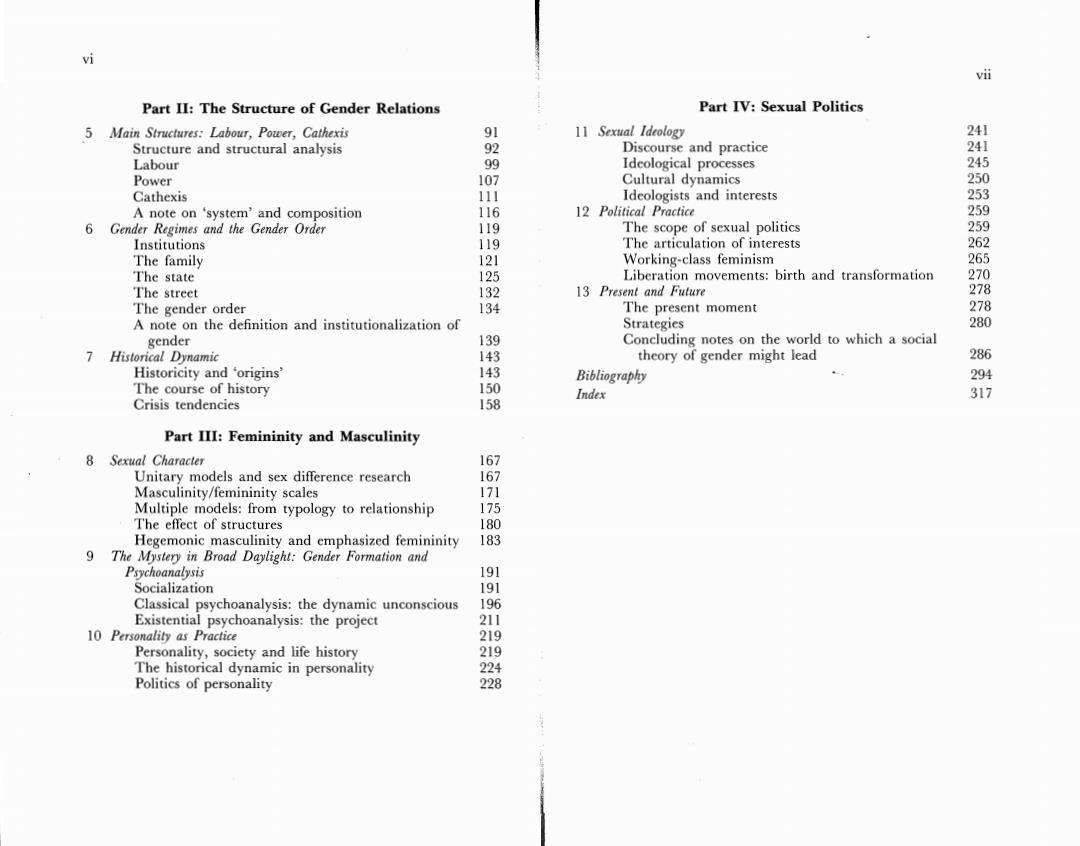
vi vii Part II:The Structure of Gender Relations Part IV:Sexual Politics 5 Main Structures:Labour,Power,Cathexis 91 11 Sexual Ideology 241 Structure and structural analysis 92 Discourse and practice 241 Labour 99 Ideological processes 245 Power 107 Cultural dynamics 250 Cathexis 111 Ideologists and interests 253 A note on 'system'and composition 116 12 Political Practice 259 6 Gender Regimes and the Gender Order 119 The scope of sexual politics 259 Institutions 119 The articulation of interests 262 The family 121 Working-class feminism 265 The state 125 Liberation movements:birth and transformation 270 The street 132 13 Present and Future 278 The gender order 134 The present moment 278 A note on the definition and institutionalization of Strategies 280 gender 139 Concluding notes on the world to which a social 7 Historical Dynamic 143 theory of gender might lead 286 Historicity and 'origins' 143 Bibliography 294 The course of history 150 Index 317 Crisis tendencies 158 Part III:Femininity and Masculinity 8 Sexual Character 167 Unitary models and sex difference research 167 Masculinity/femininity scales 171 Multiple models:from typology to relationship 175 The effect of structures 180 Hegemonic masculinity and emphasized femininity 183 9 The Mystery in Broad Daylight:Gender Formation and Psychoanalysis 191 Socialization 191 Classical psychoanalysis:the dynamic unconscious 196 Existential psychoanalysis:the project 211 10 Personality as Practice 219 Personality,society and life history 219 The historical dynamic in personality 224 Politics of personality 228
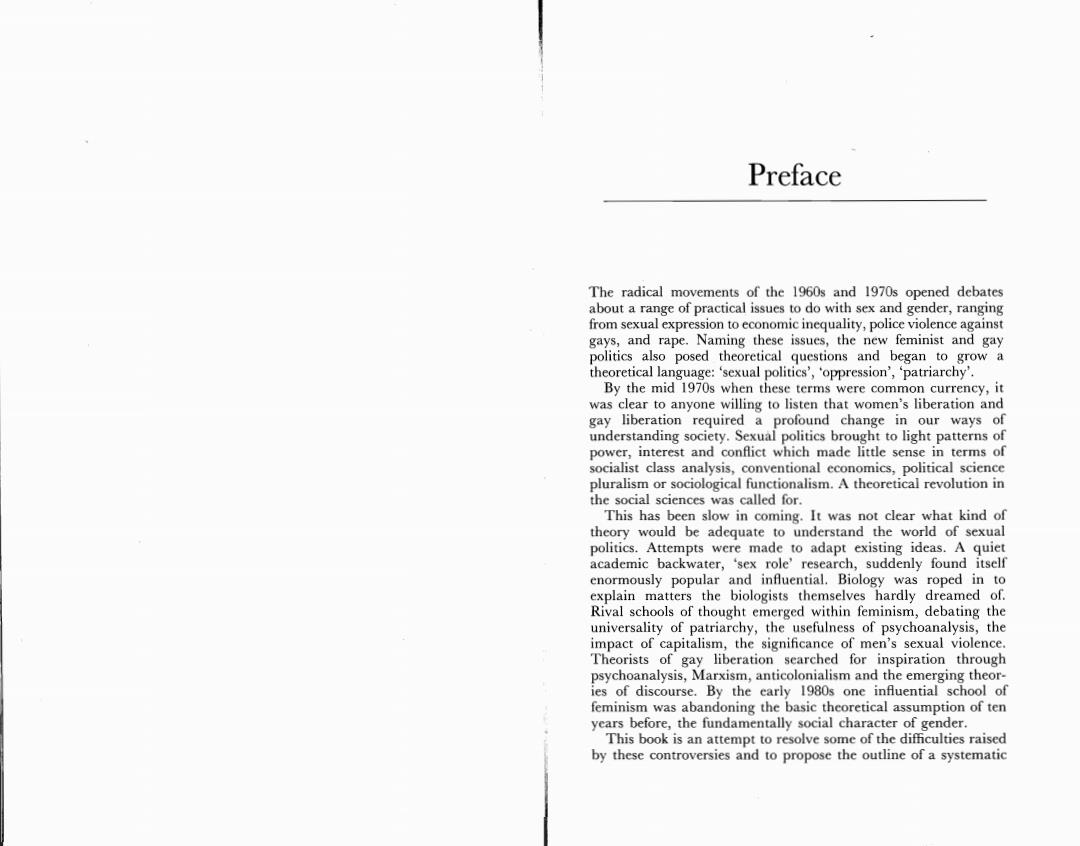
Preface The radical movements of the 1960s and 1970s opened debates about a range of practical issues to do with sex and gender,ranging from sexual expression to economic inequality,police violence against gays,and rape.Naming these issues,the new feminist and gay politics also posed theoretical questions and began to grow a theoretical language:'sexual politics','oppression',patriarchy'. By the mid 1970s when these terms were common currency,it was clear to anyone willing to listen that women's liberation and gay liberation required a profound change in our ways of understanding society.Sexual politics brought to light patterns of power,interest and conflict which made little sense in terms of socialist class analysis,conventional economics,political science pluralism or sociological functionalism.A theoretical revolution in the social sciences was called for. This has been slow in coming.It was not clear what kind of theory would be adequate to understand the world of sexual politics.Attempts were made to adapt existing ideas.A quiet academic backwater,'sex role'research,suddenly found itself enormously popular and influential.Biology was roped in to explain matters the biologists themselves hardly dreamed of. Rival schools of thought emerged within feminism,debating the universality of patriarchy,the usefulness of psychoanalysis,the impact of capitalism,the significance of men's sexual violence. Theorists of gay liberation searched for inspiration through psychoanalysis,Marxism,anticolonialism and the emerging theor- ies of discourse.By the early 1980s one influential school of feminism was abandoning the basic theoretical assumption of ten years before,the fundamentally social character of gender. This book is an attempt to resolve some of the difficulties raised by these controversies and to propose the outline of a systematic
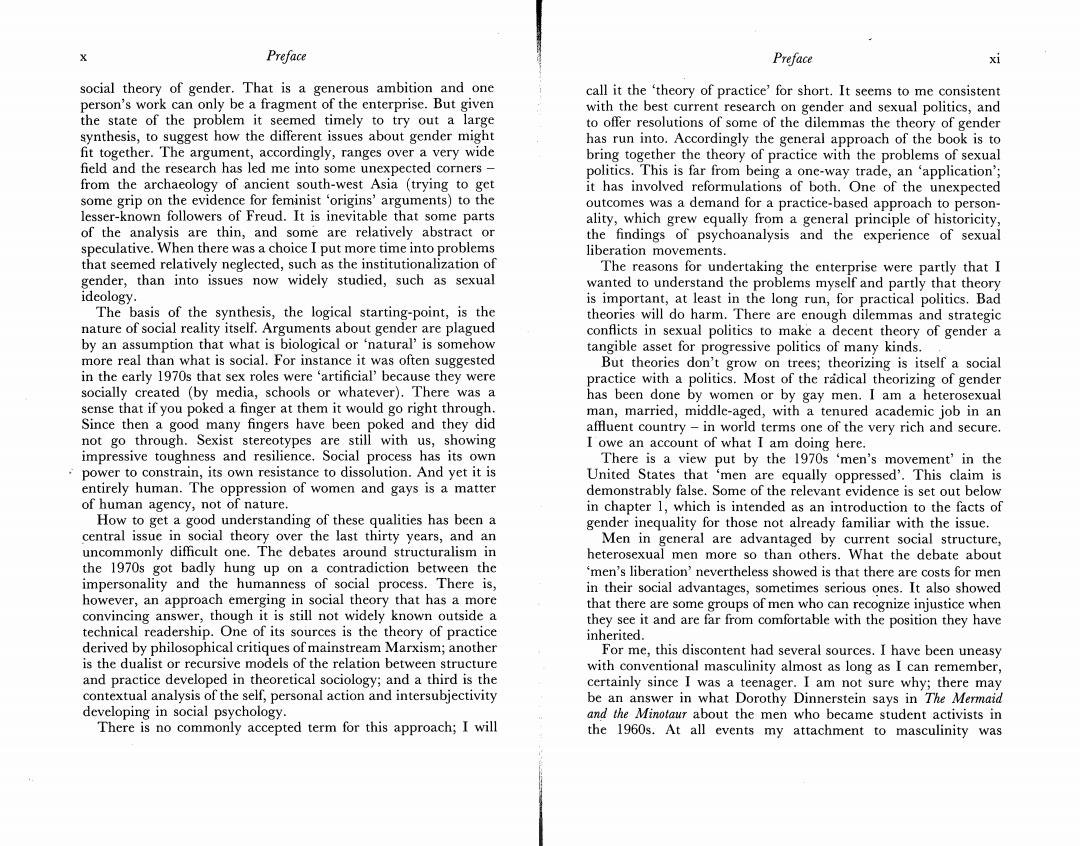
X Preface Preface xi social theory of gender.That is a generous ambition and one call it the 'theory of practice'for short.It seems to me consistent person's work can only be a fragment of the enterprise.But given with the best current research on gender and sexual politics,and the state of the problem it seemed timely to try out a large to offer resolutions of some of the dilemmas the theory of gender synthesis,to suggest how the different issues about gender might has run into.Accordingly the general approach of the book is to fit together.The argument,accordingly,ranges over a very wide bring together the theory of practice with the problems of sexual field and the research has led me into some unexpected corners politics.This is far from being a one-way trade,an application'; from the archaeology of ancient south-west Asia (trying to get it has involved reformulations of both.One of the unexpected some grip on the evidence for feminist'origins'arguments)to the outcomes was a demand for a practice-based approach to person- lesser-known followers of Freud.It is inevitable that some parts ality,which grew equally from a general principle of historicity, of the analysis are thin,and some are relatively abstract or the findings of psychoanalysis and the experience of sexual speculative.When there was a choice I put more time into problems liberation movements. that seemed relatively neglected,such as the institutionalization of The reasons for undertaking the enterprise were partly that I gender,than into issues now widely studied,such as sexual wanted to understand the problems myself and partly that theory ideology. is important,at least in the long run,for practical politics.Bad The basis of the synthesis,the logical starting-point,is the theories will do harm.There are enough dilemmas and strategic nature of social reality itself.Arguments about gender are plagued conflicts in sexual politics to make a decent theory of gender a by an assumption that what is biological or natural'is somehow tangible asset for progressive politics of many kinds. more real than what is social.For instance it was often suggested But theories don't grow on trees;theorizing is itself a social in the early 1970s that sex roles were'artificial'because they were practice with a politics.Most of the radical theorizing of gender socially created (by media,schools or whatever).There was a has been done by women or by gay men.I am a heterosexual sense that if you poked a finger at them it would go right through. man,married,middle-aged,with a tenured academic job in an Since then a good many fingers have been poked and they did affluent country-in world terms one of the very rich and secure. not go through.Sexist stereotypes are still with us,showing I owe an account of what I am doing here. impressive toughness and resilience.Social process has its own There is a view put by the 1970s 'men's movement'in the power to constrain,its own resistance to dissolution.And yet it is United States that 'men are equally oppressed'.This claim is entirely human.The oppression of women and gays is a matter demonstrably false.Some of the relevant evidence is set out below of human agency,not of nature. in chapter 1,which is intended as an introduction to the facts of How to get a good understanding of these qualities has been a gender inequality for those not already familiar with the issue. central issue in social theory over the last thirty years,and an Men in general are advantaged by current social structure, uncommonly difficult one.The debates around structuralism in heterosexual men more so than others.What the debate about the 1970s got badly hung up on a contradiction between the 'men's liberation'nevertheless showed is that there are costs for men impersonality and the humanness of social process.There is, in their social advantages,sometimes serious ones.It also showed however,an approach emerging in social theory that has a more that there are some groups of men who can recognize injustice when convincing answer,though it is still not widely known outside a they see it and are far from comfortable with the position they have technical readership.One of its sources is the theory of practice inherited. derived by philosophical critiques of mainstream Marxism;another For me,this discontent had several sources.I have been uneasy is the dualist or recursive models of the relation between structure with conventional masculinity almost as long as I can remember, and practice developed in theoretical sociology;and a third is the certainly since I was a teenager.I am not sure why;there may contextual analysis of the self,personal action and intersubjectivity be an answer in what Dorothy Dinnerstein says in The Mermaid developing in social psychology. and the Minotaur about the men who became student activists in There is no commonly accepted term for this approach;I will the 1960s.At all events my attachment to masculinity was
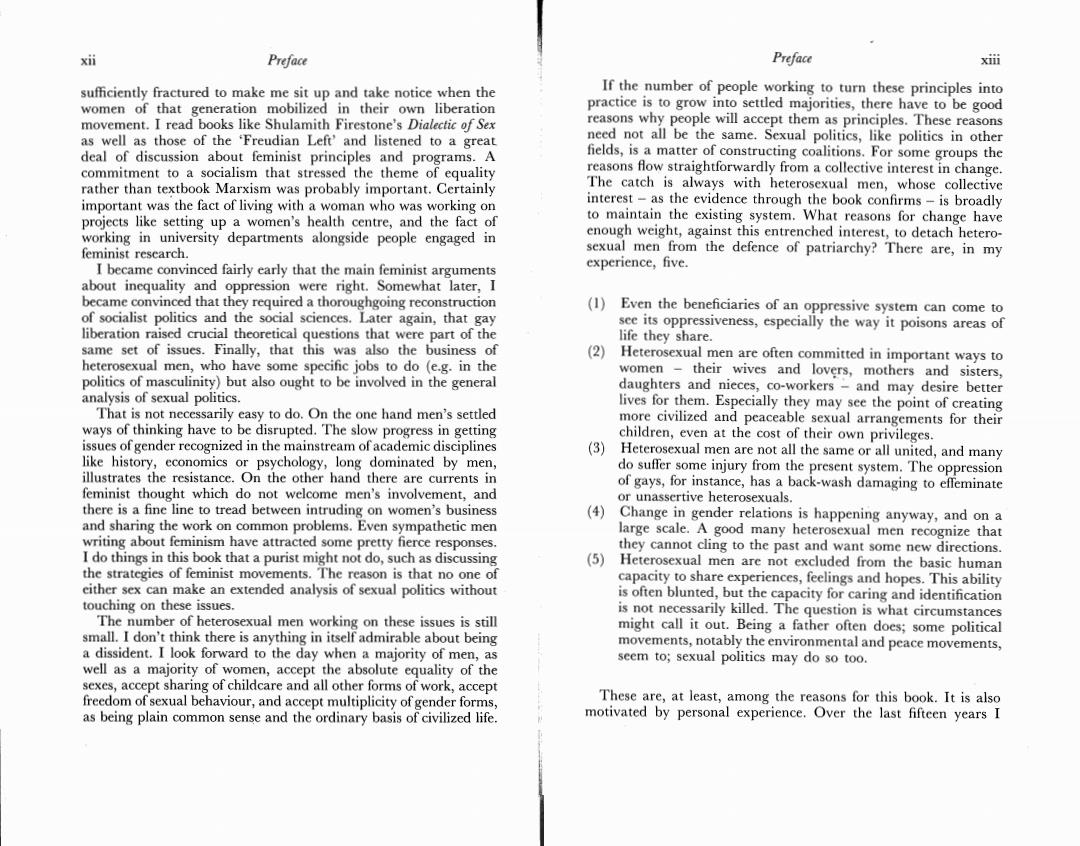
xii Preface Preface xiii sufficiently fractured to make me sit up and take notice when the If the number of people working to turn these principles into women of that generation mobilized in their own liberation practice is to grow into settled majorities,there have to be good movement.I read books like Shulamith Firestone's Dialectic of Sex reasons why people will accept them as principles.These reasons as well as those of the 'Freudian Left'and listened to a great need not all be the same.Sexual politics,like politics in other deal of discussion about feminist principles and programs.A fields,is a matter of constructing coalitions.For some groups the commitment to a socialism that stressed the theme of equality reasons flow straightforwardly from a collective interest in change. rather than textbook Marxism was probably important.Certainly The catch is always with heterosexual men,whose collective important was the fact of living with a woman who was working on interest-as the evidence through the book confirms-is broadly projects like setting up a women's health centre,and the fact of to maintain the existing system.What reasons for change have working in university departments alongside people engaged in enough weight,against this entrenched interest,to detach hetero- feminist research. sexual men from the defence of patriarchy?There are,in my I became convinced fairly early that the main feminist arguments experience,five. about inequality and oppression were right.Somewhat later,I became convinced that they required a thoroughgoing reconstruction (1) Even the beneficiaries of an oppressive system can come to of socialist politics and the social sciences.Later again,that gay see its oppressiveness,especially the way it poisons areas of liberation raised crucial theoretical questions that were part of the life they share. same set of issues.Finally,that this was also the business of (2) Heterosexual men are often committed in important ways to heterosexual men,who have some specific jobs to do (e.g.in the women -their wives and lovers,mothers and sisters, politics of masculinity)but also ought to be involved in the general daughters and nieces,co-workers -and may desire better analysis of sexual politics. lives for them.Especially they may see the point of creating That is not necessarily easy to do.On the one hand men's settled more civilized and peaceable sexual arrangements for their ways of thinking have to be disrupted.The slow progress in getting children,even at the cost of their own privileges. issues of gender recognized in the mainstream of academic disciplines (3) Heterosexual men are not all the same or all united,and many like history,economics or psychology,long dominated by men, illustrates the resistance.On the other hand there are currents in do suffer some injury from the present system.The oppression of gays,for instance,has a back-wash damaging to effeminate feminist thought which do not welcome men's involvement,and or unassertive heterosexuals. there is a fine line to tread between intruding on women's business (4) Change in gender relations is happening anyway,and on a and sharing the work on common problems.Even sympathetic men large scale.A good many heterosexual men recognize that writing about feminism have attracted some pretty fierce responses. they cannot cling to the past and want some new directions. I do things in this book that a purist might not do,such as discussing (5) Heterosexual men are not excluded from the basic human the strategies of feminist movements.The reason is that no one of capacity to share experiences,feelings and hopes.This ability either sex can make an extended analysis of sexual politics without is often blunted,but the capacity for caring and identification touching on these issues. is not necessarily killed.The question is what circumstances The number of heterosexual men working on these issues is still might call it out.Being a father often does;some political small.I don't think there is anything in itself admirable about being movements,notably the environmental and peace movements, a dissident.I look forward to the day when a majority of men,as seem to;sexual politics may do so too. well as a majority of women,accept the absolute equality of the sexes,accept sharing of childcare and all other forms of work,accept freedom of sexual behaviour,and accept multiplicity of gender forms, These are,at least,among the reasons for this book.It is also as being plain common sense and the ordinary basis of civilized life. motivated by personal experience.Over the last fifteen years I
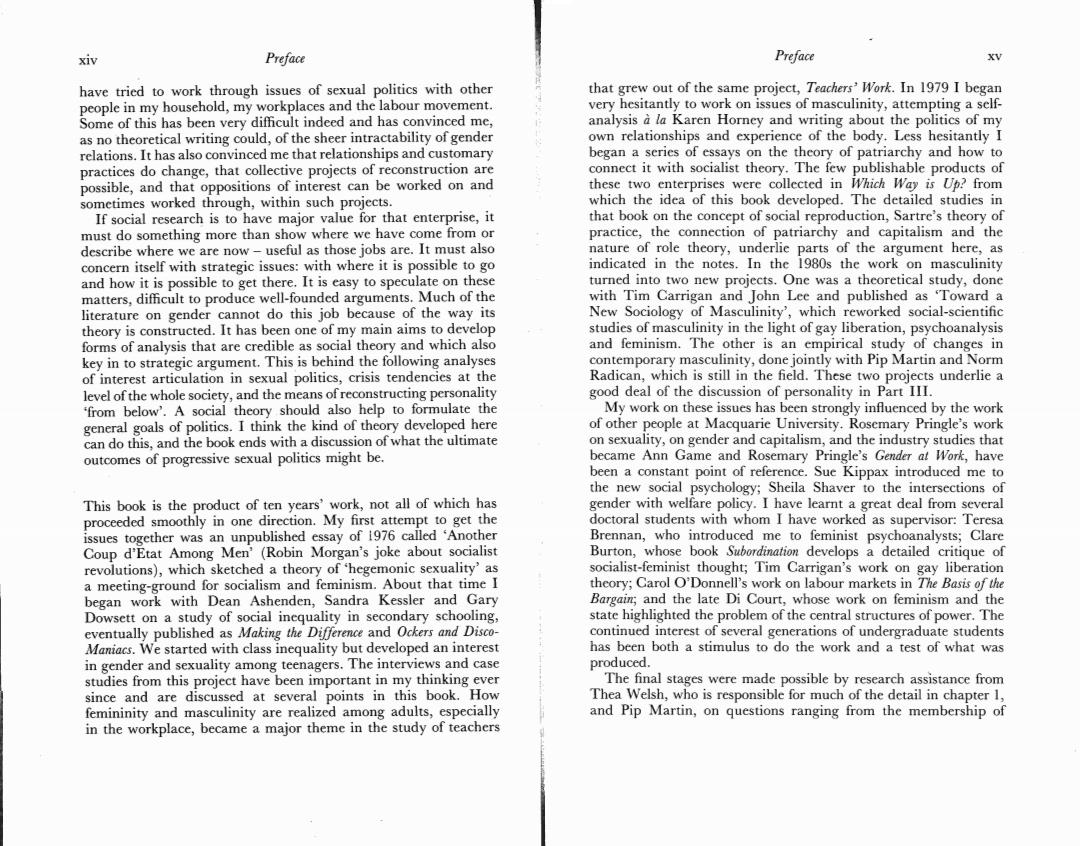
xiv Preface Preface XV have tried to work through issues of sexual politics with other that grew out of the same project,Teachers'Work.In 1979 I began people in my household,my workplaces and the labour movement. very hesitantly to work on issues of masculinity,attempting a self- Some of this has been very difficult indeed and has convinced me, analysis a la Karen Horney and writing about the politics of my as no theoretical writing could,of the sheer intractability of gender own relationships and experience of the body.Less hesitantly I relations.It has also convinced me that relationships and customary began a series of essays on the theory of patriarchy and how to practices do change,that collective projects of reconstruction are connect it with socialist theory.The few publishable products of possible,and that oppositions of interest can be worked on and these two enterprises were collected in Which Way is Up?from sometimes worked through,within such projects. which the idea of this book developed.The detailed studies in If social research is to have major value for that enterprise,it that book on the concept of social reproduction,Sartre's theory of must do something more than show where we have come from or practice,the connection of patriarchy and capitalism and the describe where we are now-useful as those jobs are.It must also nature of role theory,underlie parts of the argument here,as concern itself with strategic issues:with where it is possible to go indicated in the notes.In the 1980s the work on masculinity and how it is possible to get there.It is easy to speculate on these turned into two new projects.One was a theoretical study,done matters,difficult to produce well-founded arguments.Much of the with Tim Carrigan and John Lee and published as 'Toward a literature on gender cannot do this job because of the way its New Sociology of Masculinity',which reworked social-scientific theory is constructed.It has been one of my main aims to develop studies of masculinity in the light of gay liberation,psychoanalysis forms of analysis that are credible as social theory and which also and feminism.The other is an empirical study of changes in key in to strategic argument.This is behind the following analyses contemporary masculinity,done jointly with Pip Martin and Norm of interest articulation in sexual politics,crisis tendencies at the Radican,which is still in the field.These two projects underlie a level of the whole society,and the means of reconstructing personality good deal of the discussion of personality in Part III. 'from below'.A social theory should also help to formulate the My work on these issues has been strongly influenced by the work general goals of politics.I think the kind of theory developed here of other people at Macquarie University.Rosemary Pringle's work can do this,and the book ends with a discussion of what the ultimate on sexuality,on gender and capitalism,and the industry studies that outcomes of progressive sexual politics might be. became Ann Game and Rosemary Pringle's Gender at Work,have been a constant point of reference.Sue Kippax introduced me to the new social psychology;Sheila Shaver to the intersections of This book is the product of ten years'work,not all of which has gender with welfare policy.I have learnt a great deal from several proceeded smoothly in one direction.My first attempt to get the doctoral students with whom I have worked as supervisor:Teresa issues together was an unpublished essay of 1976 called 'Another Brennan,who introduced me to feminist psychoanalysts;Clare Coup d'Etat Among Men'(Robin Morgan's joke about socialist Burton,whose book Subordination develops a detailed critique of revolutions),which sketched a theory of'hegemonic sexuality'as socialist-feminist thought;Tim Carrigan's work on gay liberation a meeting-ground for socialism and feminism.About that time I theory;Carol O'Donnell's work on labour markets in The Basis of the began work with Dean Ashenden,Sandra Kessler and Gary Bargain;and the late Di Court,whose work on feminism and the Dowsett on a study of social inequality in secondary schooling, state highlighted the problem of the central structures of power.The eventually published as Making the Difference and Ockers and Disco- continued interest of several generations of undergraduate students Maniacs.We started with class inequality but developed an interest has been both a stimulus to do the work and a test of what was in gender and sexuality among teenagers.The interviews and case produced. studies from this project have been important in my thinking ever The final stages were made possible by research assistance from since and are discussed at several points in this book.How Thea Welsh,who is responsible for much of the detail in chapter 1, femininity and masculinity are realized among adults,especially and Pip Martin,on questions ranging from the membership of in the workplace,became a major theme in the study of teachers
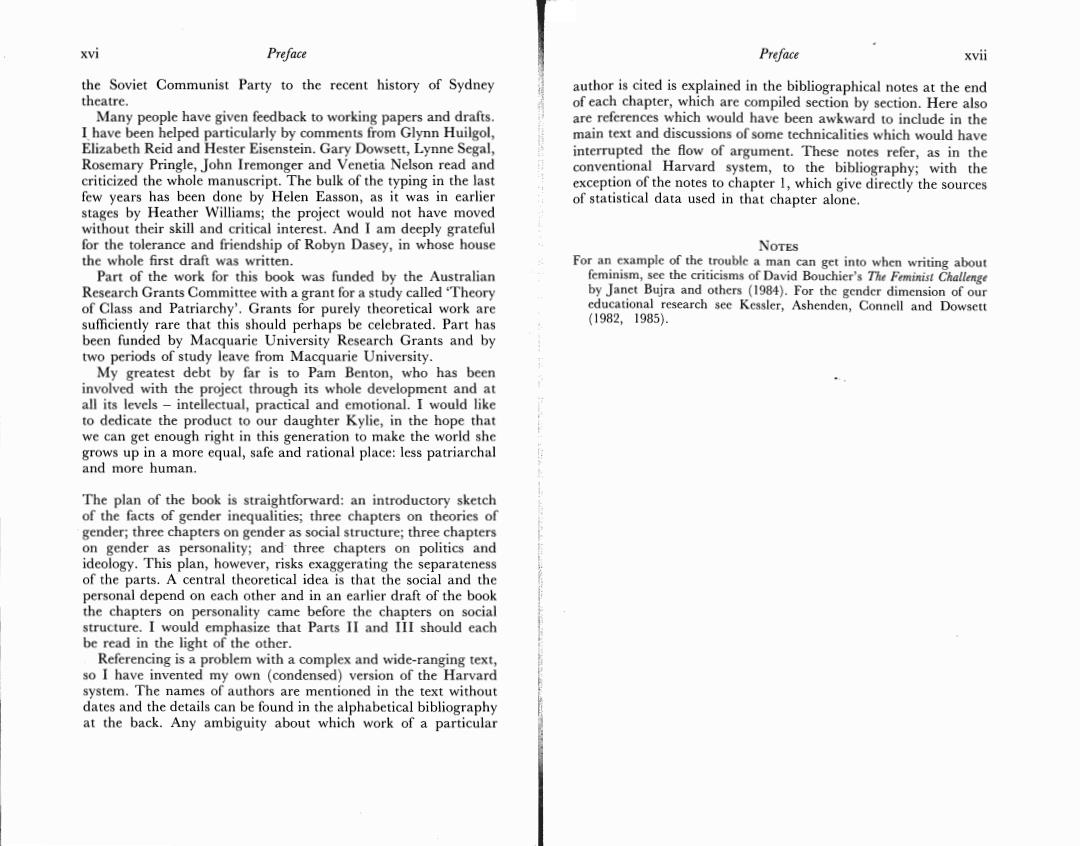
xvi Preface Preface xvii the Soviet Communist Party to the recent history of Sydney author is cited is explained in the bibliographical notes at the end theatre. of each chapter,which are compiled section by section.Here also Many people have given feedback to working papers and drafts. are references which would have been awkward to include in the I have been helped particularly by comments from Glynn Huilgol, main text and discussions of some technicalities which would have Elizabeth Reid and Hester Eisenstein.Gary Dowsett,Lynne Segal, interrupted the flow of argument.These notes refer,as in the Rosemary Pringle,John Iremonger and Venetia Nelson read and conventional Harvard system,to the bibliography;with the criticized the whole manuscript.The bulk of the typing in the last exception of the notes to chapter 1,which give directly the sources few years has been done by Helen Easson,as it was in earlier of statistical data used in that chapter alone. stages by Heather Williams;the project would not have moved without their skill and critical interest.And I am deeply grateful for the tolerance and friendship of Robyn Dasey,in whose house NOTES the whole first draft was written. For an example of the trouble a man can get into when writing about Part of the work for this book was funded by the Australian feminism,see the criticisms of David Bouchier's The Feminist Challenge Research Grants Committee with a grant for a study called Theory by Janet Bujra and others (1984).For the gender dimension of our of Class and Patriarchy'.Grants for purely theoretical work are educational research see Kessler,Ashenden,Connell and Dowsett sufficiently rare that this should perhaps be celebrated.Part has (1982,1985). been funded by Macquarie University Research Grants and by two periods of study leave from Macquarie University. My greatest debt by far is to Pam Benton,who has been involved with the project through its whole development and at all its levels-intellectual,practical and emotional.I would like to dedicate the product to our daughter Kylie,in the hope that we can get enough right in this generation to make the world she grows up in a more equal,safe and rational place:less patriarchal and more human. The plan of the book is straightforward:an introductory sketch of the facts of gender inequalities;three chapters on theories of gender;three chapters on gender as social structure;three chapters on gender as personality;and three chapters on politics and ideology.This plan,however,risks exaggerating the separateness of the parts.A central theoretical idea is that the social and the personal depend on each other and in an earlier draft of the book the chapters on personality came before the chapters on social structure.I would emphasize that Parts II and III should each be read in the light of the other. Referencing is a problem with a complex and wide-ranging text, so I have invented my own (condensed)version of the Harvard system.The names of authors are mentioned in the text without dates and the details can be found in the alphabetical bibliography at the back.Any ambiguity about which work of a particular
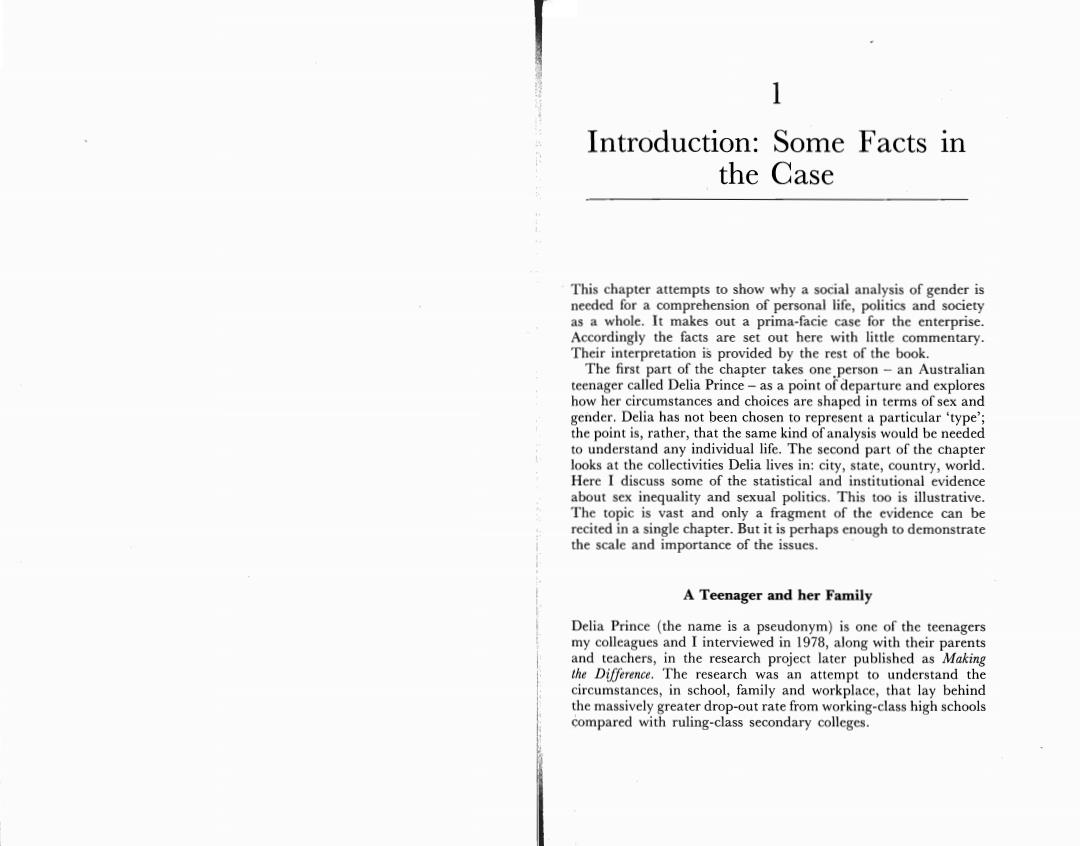
1 Introduction:Some Facts in the Case This chapter attempts to show why a social analysis of gender is needed for a comprehension of personal life,politics and society as a whole.It makes out a prima-facie case for the enterprise. Accordingly the facts are set out here with little commentary. Their interpretation is provided by the rest of the book. The first part of the chapter takes one person-an Australian teenager called Delia Prince-as a point of departure and explores how her circumstances and choices are shaped in terms of sex and gender.Delia has not been chosen to represent a particular 'type'; the point is,rather,that the same kind of analysis would be needed to understand any individual life.The second part of the chapter looks at the collectivities Delia lives in:city,state,country,world. Here I discuss some of the statistical and institutional evidence about sex inequality and sexual politics.This too is illustrative. The topic is vast and only a fragment of the evidence can be recited in a single chapter.But it is perhaps enough to demonstrate the scale and importance of the issues. A Teenager and her Family Delia Prince (the name is a pseudonym)is one of the teenagers my colleagues and I interviewed in 1978,along with their parents and teachers,in the research project later published as Making the Difference.The research was an attempt to understand the circumstances,in school,family and workplace,that lay behind the massively greater drop-out rate from working-class high schools compared with ruling-class secondary colleges
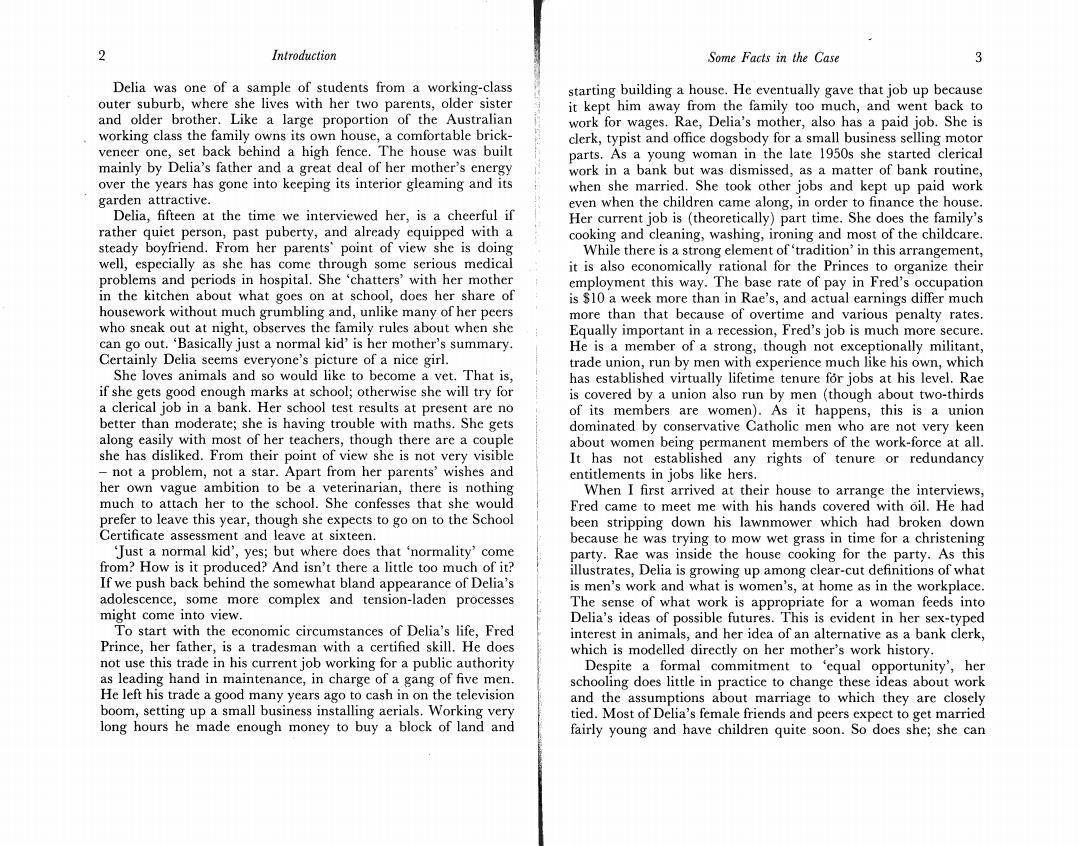
2 Introduction Some Facts in the Case 3 Delia was one of a sample of students from a working-class starting building a house.He eventually gave that job up because outer suburb,where she lives with her two parents,older sister it kept him away from the family too much,and went back to and older brother.Like a large proportion of the Australian work for wages.Rae,Delia's mother,also has a paid job.She is working class the family owns its own house,a comfortable brick- clerk,typist and office dogsbody for a small business selling motor veneer one,set back behind a high fence.The house was built parts.As a young woman in the late 1950s she started clerical mainly by Delia's father and a great deal of her mother's energy work in a bank but was dismissed,as a matter of bank routine, over the years has gone into keeping its interior gleaming and its when she married.She took other jobs and kept up paid work garden attractive. even when the children came along,in order to finance the house. Delia,fifteen at the time we interviewed her,is a cheerful if Her current job is(theoretically)part time.She does the family's rather quiet person,past puberty,and already equipped with a cooking and cleaning,washing,ironing and most of the childcare. steady boyfriend.From her parents'point of view she is doing While there is a strong element of'tradition'in this arrangement, well,especially as she has come through some serious medical it is also economically rational for the Princes to organize their problems and periods in hospital.She 'chatters'with her mother employment this way.The base rate of pay in Fred's occupation in the kitchen about what goes on at school,does her share of is $10 a week more than in Rae's,and actual earnings differ much housework without much grumbling and,unlike many of her peers more than that because of overtime and various penalty rates. who sneak out at night,observes the family rules about when she Equally important in a recession,Fred's job is much more secure. can go out.Basically just a normal kid'is her mother's summary. He is a member of a strong,though not exceptionally militant, Certainly Delia seems everyone's picture of a nice girl. trade union,run by men with experience much like his own,which She loves animals and so would like to become a vet.That is, has established virtually lifetime tenure for jobs at his level.Rae if she gets good enough marks at school;otherwise she will try for is covered by a union also run by men (though about two-thirds a clerical job in a bank.Her school test results at present are no of its members are women).As it happens,this is a union better than moderate;she is having trouble with maths.She gets dominated by conservative Catholic men who are not very keen along easily with most of her teachers,though there are a couple about women being permanent members of the work-force at all. she has disliked.From their point of view she is not very visible It has not established any rights of tenure or redundancy not a problem,not a star.Apart from her parents'wishes and entitlements in jobs like hers. her own vague ambition to be a veterinarian,there is nothing When I first arrived at their house to arrange the interviews, much to attach her to the school.She confesses that she would Fred came to meet me with his hands covered with oil.He had prefer to leave this year,though she expects to go on to the School been stripping down his lawnmower which had broken down Certificate assessment and leave at sixteen. because he was trying to mow wet grass in time for a christening Just a normal kid',yes;but where does that normality'come party.Rae was inside the house cooking for the party.As this from?How is it produced?And isn't there a little too much of it? illustrates,Delia is growing up among clear-cut definitions of what If we push back behind the somewhat bland appearance of Delia's is men's work and what is women's,at home as in the workplace. adolescence,some more complex and tension-laden processes The sense of what work is appropriate for a woman feeds into might come into view. Delia's ideas of possible futures.This is evident in her sex-typed To start with the economic circumstances of Delia's life,Fred interest in animals,and her idea of an alternative as a bank clerk. Prince,her father,is a tradesman with a certified skill.He does which is modelled directly on her mother's work history. not use this trade in his current job working for a public authority Despite a formal commitment to 'equal opportunity',her as leading hand in maintenance,in charge of a gang of five men. schooling does little in practice to change these ideas about work He left his trade a good many years ago to cash in on the television and the assumptions about marriage to which they are closely boom,setting up a small business installing aerials.Working very tied.Most of Delia's female friends and peers expect to get married long hours he made enough money to buy a block of land and fairly young and have children quite soon.So does she;she can